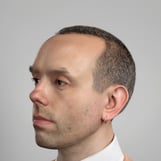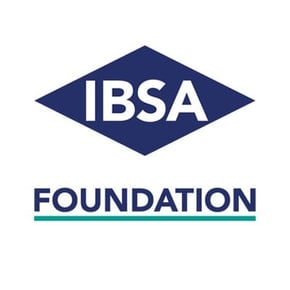Conversation on art and science with Ed Atkins - SciArt SwitzerlAnd
Wednesday, 20th of November, 6:30 pm at MASI Lugano, LAC Exhibition venue, Piazza Luini 6 - Lugano
The artist Ed Atkins (UK, 1982) was the protagonist of the autumn dialogue of SciArt SwitzerlAnd 2024, realised in collaboration with MASI Lugano. The dialogue with Mike Sperlinger, curator and Head of Programme at the Office of Contemporary Art Norway, explored the boundaries between real-life experiences and digital worlds.
The artist explored the themes of loss, intimacy and melancholy through videos, installations, text and drawings, and often CGI avatars. Atkins’ digital creatures spoke directly to the viewer, questioning their capacity for empathy. Addressing contemporary culture’s fetishism of the media, which meticulously imitate reality yet fail to preserve its depth, Atkins explored the possibility of affection – bodily and emotional – in an age that sees us grappling with digital technologies and tools that are as useful as they are easy to abuse.
Free event with free entry
The conversation was held in English with simultaneous interpreting in Italian
Booking allowed you to reserve a seat but was not mandatory for admission to the event.








Ed Atkins

Ed Atkins (United Kingdom, 1982) lives and works in Copenhagen. Through videos, drawings and writing, he sheds light on how digital media and contemporary languages seek to harness and render highly emotive sensory experiences. His latest one-person exhibitions include those staged at Tank, Shanghai (2022); New Museum, New York (2021); Kunsthaus Bregenz, and K21 in Düsseldorf (both in 2019); Martin-Gropius-Bau, Berlin; MMK, Frankfurt; DHC/ART, Montreal (all in 2017); Castello di Rivoli and Fondazione Sandretto Re Rebaudengo, Turin; The Kitchen, New York; SMK, Copenhagen (all in 2016); Stedelijk Museum Amsterdam (2015), The Serpentine Galleries, London (2014); Julia Stoschek Collection, Düsseldorf (2013); and MoMA PS1 (2012). Atkins will present an exhibition at the Tate Britain in spring 2025.
Mike Sperlinger

Mike Sperlinger is Head of Programme at the Office of Contemporary Art Norway. A writer and curator, he was previously Professor of Writing and Theory at the Oslo Academy of Fine Art. Recent curatorial projects include the moving image exhibition Counterimaginaries (Tromsø Kunstforening, 2023), The Social Life of Film (a congress of nomadic screening collectives in Copenhagen, 2023), and a series of exhibitions with the late German artist Marianne Wex. From 2001-13, he was Assistant Director of LUX, a London-based organisation for artists working with the moving image which he co-founded with Benjamin Cook. He is the editor of several publications, including Afterthought: New Writing on Conceptual Art (2005) and Here Is Information. Mobilise – Selected writings by Ian White (2016).
What is SciArt SwitzerlAnd?
SciArt SwitzerlAnd is a project by IBSA Foundation for scientific research, in partnership with LAC Lugano Arte e Cultura and MASI Lugano (Museo d’arte della Svizzera italiana).
Science and the arts have always coexisted through time and space. Albeit with different methods and for different purposes, artists and scientists both observe the world around them and open up new perspectives, interpretations and meanings for us to explore.
Using different event formats and digital products, SciArt SwitzerlAnd intends to focus on artistic creations that have been transformed as a result of interactions with scientists, new discoveries and research institutions.
The public will be offered a look at fascinating projects, the products of different dimensions intersecting, and will be able to listen to the voices of artists and scientists explaining the extent to which spheres that are so different can mutually influence one another.
The new project is perfectly aligned with the mission of the Foundation, which has been committed since 2012 to disseminating scientific culture that is trustworthy, sharing principles and knowledge using language that is accessible, and raising awareness of topics relating to science and culture as well as to personal health and well-being.
Interviews
Full Event




